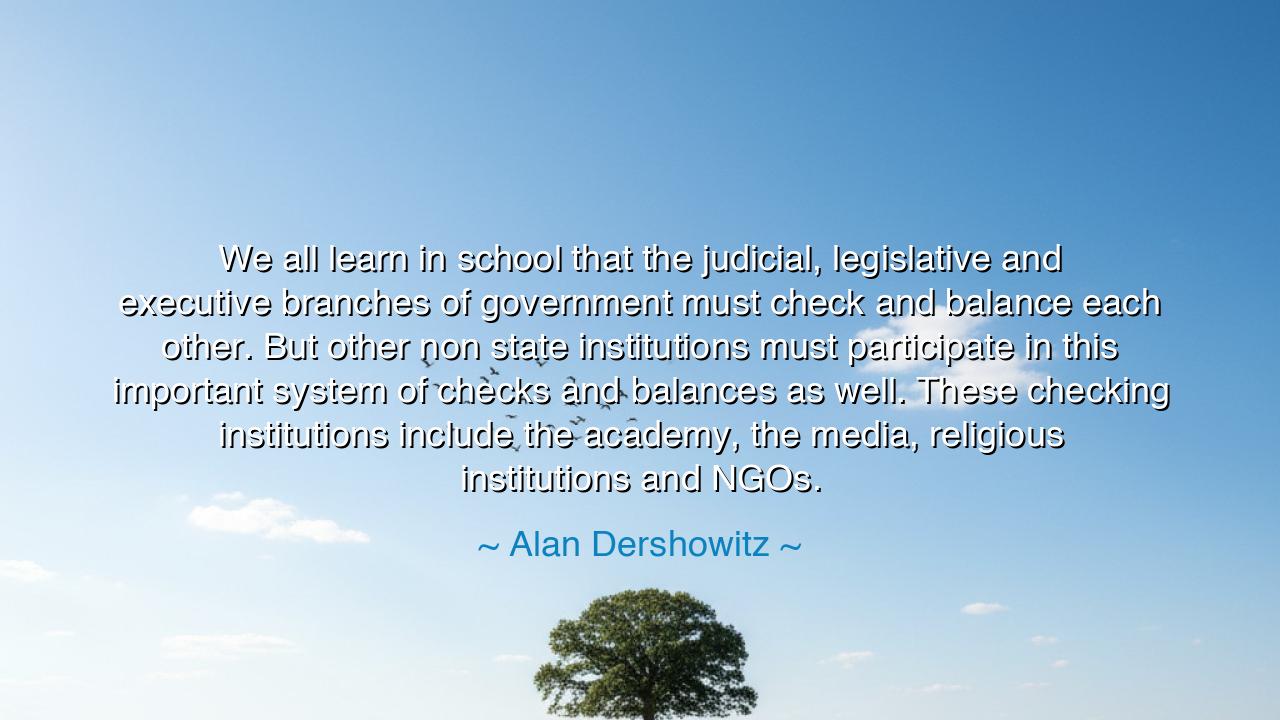
We all learn in school that the judicial, legislative and
We all learn in school that the judicial, legislative and executive branches of government must check and balance each other. But other non state institutions must participate in this important system of checks and balances as well. These checking institutions include the academy, the media, religious institutions and NGOs.






When Alan Dershowitz proclaimed, “We all learn in school that the judicial, legislative and executive branches of government must check and balance each other. But other non-state institutions must participate in this important system of checks and balances as well. These checking institutions include the academy, the media, religious institutions and NGOs,” he spoke not as a mere scholar of law, but as a guardian of liberty, calling attention to the invisible pillars that uphold democracy. His words remind us that freedom does not survive on government structure alone — it thrives through the moral vigilance of society. The state, left to balance only itself, becomes a self-contained machine, efficient yet unfeeling. It is the people — through their schools, their voices, their faiths, their movements — who breathe conscience into that machinery and ensure that justice remains human.
The origin of this quote lies in Dershowitz’s long career as a constitutional lawyer, defender of civil liberties, and professor at Harvard Law School. Having witnessed both the triumphs and failures of democratic systems, he understood that even the most beautifully designed constitution can falter when the citizens it governs grow passive. The founding fathers of the United States envisioned a government of divided powers — judicial, legislative, and executive — but they could not have foreseen the complexities of modern power: the manipulation of information, the influence of global corporations, or the soft tyranny of social indifference. Dershowitz’s insight extends the ancient principle of checks and balances beyond the walls of government, reminding us that democracy is not a fixed architecture, but a living organism that must be nourished by truth, education, and moral courage.
In the style of the ancients, his wisdom could be likened to that of the philosopher Polybius, who wrote that the balance of powers preserves liberty only so long as virtue endures among the people. Dershowitz echoes this ancient conviction, but brings it into the modern age: today’s tyrants are not only kings or dictators, but systems — bureaucratic, digital, or ideological — that suffocate dissent. Thus, he calls upon the academy to uphold truth over comfort, the media to defend transparency over propaganda, the churches and religious institutions to guard morality over power, and the NGOs to act as the conscience of civilization. Together, these institutions form the unseen armor of democracy, protecting it from the decay that begins when people surrender their responsibility to think, speak, and act.
History offers many warnings of what happens when these non-state guardians fall silent. Consider Nazi Germany, where the government’s legal structure remained intact even as its spirit was poisoned. The courts obeyed, the legislature complied, and the executive ruled — all within a framework of law. What failed were the external checks: universities silenced dissenting scholars, newspapers became the mouthpieces of lies, churches feared confrontation, and civic organizations were dissolved or co-opted. The tragedy was not merely the corruption of government, but the collapse of conscience beyond it. Dershowitz’s words resound as a solemn reminder: when society’s independent voices cease to question, tyranny no longer needs to conquer — it simply inherits.
Yet, his teaching is not one of despair, but of awakening. He reminds us that freedom is not kept alive by institutions alone, but by the spirit that moves within them. When the academy seeks truth rather than popularity, when the press values honesty over influence, when faith uplifts compassion rather than control, when NGOs defend the voiceless instead of the powerful — then the nation stands secure. The strength of democracy lies not in the perfection of its leaders, but in the vigilance of its people. The true system of checks and balances begins not in government halls, but in the conscience of the citizen.
This truth is evident even in modern times. During the civil rights movement in the United States, the government’s three branches were not enough to challenge injustice — it was the people, through churches, universities, and the press, who shook the conscience of the nation. Ministers like Dr. Martin Luther King Jr., journalists like Ida B. Wells, and countless educators and activists became the moral compass that turned law toward justice. Their courage proved Dershowitz’s insight: that non-state institutions, animated by faith, knowledge, and truth, are indispensable to the survival of democracy.
The lesson of Alan Dershowitz’s words is this: freedom depends not only on laws, but on living guardians. Each generation must strengthen the institutions that keep power honest and truth alive. The teacher must dare to educate beyond ideology. The journalist must write even when threatened. The preacher must speak even when it is unpopular. The citizen must question even when it is inconvenient. For when these voices unite in courage, the heart of democracy beats strong; when they falter, darkness begins its quiet march.
So let these words be remembered, as a commandment for all who cherish liberty: the government balances power, but the people balance the government. The law may protect the body of freedom, but the truth protects its soul. Therefore, nurture the independent mind, defend the honest word, and cherish every institution that dares to speak truth to power — for in their courage lies the hope of every generation yet to come.






AAdministratorAdministrator
Welcome, honored guests. Please leave a comment, we will respond soon